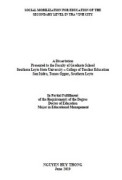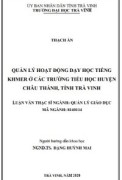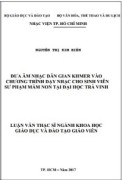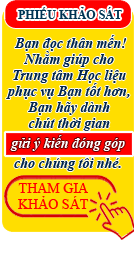


|
|
|
Tác giả: Nguyen Huy Thong; Violeta B. Felisilda, D.A (Adviser). |
|
Southern Leyte State University. Năm: 2019. |
|
Mô tả: 149Tr, kích thước: 30cm. Số định danh: 370.959786/ Th431. Vị trí: Phòng Tự Nghiên cứu. |
|
Abstract: Social mobilization for education (SMFE) is a process in which the community and the whole society participate in the development of education. By using the Mixed Research Design, this study aimed at describing and generalizing the present status and achievements of SMFE of the secondary level in TVC. A questionnaire, a series of interviews, and focus group discussion (FGD) were utilized to collect the data. Informants included 170 teachers and staff members from nine public secondary and upper-secondary schools in TVC, 22 interviewees, and 12 participants of FGD who are city leaders, education managers, parents, and investors. The findings revealed that during the implementation of SMFE of the secondary level in TVC, all the community forces and many political, social, and professional organizations in the political system have participated with different extents. Moreover, the implementation of SMFE of the secondary level in TVC has both advantages and disadvantages in which human factor plays a decisive role in the advantages. Most of competent agencies, organizations, and individuals in the community pay attention to education in general and to SMFE in particular. On the other hand, the disadvantages of SMFE of the secondary level are also caused by human factors. It was also found out that the implementation of SMFE in TVC has constituted some certain achievements in recent years. At the macro level, it helped improve the socio-economic status of the locality. At the micro level, SMFE promoted the improvement of teaching and learning facilities at public general schools and narrowed the gap among students created by pecuniary condition. The study found out that the implementation of SMFE of the secondary level in Tra Vinh City was participated in varying extents by different community forces which yielded advantages and achievements, and several of disadvantages that need their collaboration to be sustained and to be improved to provide ample benefits to the stakeholders. The findings and recommendations on the SMFE are displayed in the form of a report submitted to the city government and the education sector of Tra Vinh Province. Several public forums are planned to deliver to the school stakeholders for the findings and the recommendations of this study to be known. |
|
|
|
Tác giả: Cao Thi Hong Cam; Lilibeth S. Tindugan, Ed. D (Adviser). |
|
Southern Leyte State University. Năm: 2019. |
|
Mô tả: 107Tr, kích thước: 30cm. Số định danh: 428.007/ C104. Vị trí: Phòng Tự Nghiên cứu. |
|
Abstract: The study examined English as Foreign Language (EFL) primary teachers’ beliefs and practices on Language Learning Strategies (LLSs) in terms of the frequency of strategies used, affecting factors, and the correlation to the pupils’ language performance. There were 165 EFL teachers from the primary schools in Vietnam participating as respondents. The questionnaires and individual discussion sheets were utilized to gather quantitative and qualitative data. The findings disclosed that most of the primary teachers held beliefs that of LLSs were necessary for pupils’ language learning owing to their benefits such as the generation of effectiveness and the assistance to the development of learners’ autonomy. In the practices of LLSs, it is not about the most frequently used LLSs, but others such as Compensation and Social strategies in significantly slight correlation to the pupils' language performance. Lastly, some factors can intervene in teachers' practices of LLSs, namely teachers' beliefs of LLSs, learners' language proficiency, benefits of strategies, a supportive learning environment, and curriculum constraints. As a way of bringing the observed gap, professional development programs in the local, and implications for English teaching and learning were recommended. |
|
|
|
Tác giả: Thạch Ấn; NGND. TS. Đặng Huỳnh Mai (người hướng dẫn). |
|
Trường Đại học Trà Vinh. Năm: 2020. |
|
Mô tả: 119Tr, kích thước: 30cm. Số định danh: 372.120959786/ Â121. Vị trí: Phòng Tự Nghiên cứu. |
|
Mục tiêu nghiên cứu: Trên cơ sở hệ thống hóa lý luận, khảo sát và đánh giá thực trạng quản lý HĐDH tiếng Khmer ở các trường tiểu học huyện Châu Thành, tỉnh Trà Vinh. Xác định nguyên nhân của thực trạng và đề xuất các biện pháp nhằm góp phần nâng cao chất lượng, hiệu quả công tác quản lý HĐDH tiếng Khmer ở các trường tiểu học huyện Châu Thành, tỉnh Trà Vinh. |
|
|
|
Tác giả: Nguyễn Thị Mỹ Lan; PGS. TS. Ngô Thành Can (người hướng dẫn). |
|
Học viện Hành chính Quốc gia. Năm: 2019. |
|
Mô tả: 101Tr, kích thước: 30cm. Số định danh: 352.6/ L105. Vị trí: Phòng Tự Nghiên cứu. |
|
Mục tiêu nghiên cứu: Làm rõ những vấn đề lý luận về năng lực công chức và thực trạng năng lực công chức Văn phòng – Thống kê cấp xã trên địa bàn huyện Càng Long, tỉnh Trà Vinh. Qua đó, đề xuất những giải pháp nhằm nâng cao năng lực công chức Văn phòng – Thống kê cấp xã trên địa bàn huyện Càng Long, tỉnh Trà Vinh để đáp ứng yêu cầu phát triển tại địa phương. |
|
|
|
Tác giả: Nguyễn Thị Kim Biên; TS. Nguyễn Thế Truyền (người hướng dẫn). |
|
Nhạc Viện TP. HCM. Năm: 2017. |
|
Mô tả: 93Tr, kích thước: 30cm. Số định danh: 378.125 / B305. Vị trí: Phòng đọc. |
|
Mục tiêu nghiên cứu: Tìm ra những thể loại âm nhạc dân gian độc đáo và phù hợp để đưa vào chương trình giảng dạy âm nhạc nhằm giúp cho một số thể loại âm nhạc không bị mất đi theo thời gian, đồng thời mở ra một cơ hội để xã hội hiểu hơn về âm nhạc dân gian Khmer.
|











